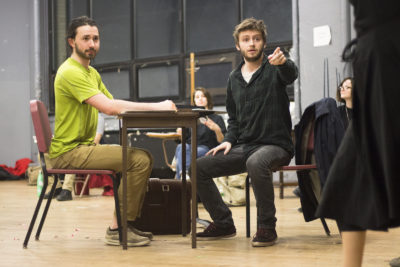
The School of Theatre at Boston University’s College of Fine Arts will inaugurate the Joan & Edgar Booth Theatre with Eugène Ionesco’s play “Rhinoceros” later this month. The play will be the theater’s first production.
Director of the production Clay Hopper said in a phone interview that the play’s story is set in a small French province during a time when residents begin turning into rhinoceroses. By the end of the play, there is one man standing who is unable to change his identity.
“The play is a play by Ionesco, who was an absurdist playwright from the 1950s,” Hopper said. “He wrote [‘Rhinoceros’] in response to the rise of fascism in Europe in the ‘30s.”
Hopper said that as people turn into rhinoceroses, they try to normalize the phenomenon through rationalization, logic, attempting to argue it away and trying to compromise it.
CFA senior Christian Abbes wrote in an email that he was is excited to portray the meaning of Ionesco’s allegory in the play.
“‘Rhinoceros’ clearly passes on the message that in our current climate, it is not enough to be silent,” Abbes wrote. “We need to stand strong against what we believe is wrong and make our voices heard, even if it means personal sacrifice, because in the end, the future we dream of is bigger than ourselves.”
CFA Dean Harvey Young said in a phone interview that CFA decided to incorporate the play as part of a season-long series in which the School of Theatre has been involved.
“Our plays resonate inside a discussion about issues of growing authoritarianism and conformity in societies in the mid-20th century,” Young said. “We started that investigation with our musical in December when we did ‘Cabaret.’”
CFA senior Mackenzie Cala plays Daisy, a strong-willed female character surrounded by men eager to discredit her. Cala wrote in an email about the process the cast went through to understand the play’s contents.
“This play directly responds to a hard-lined partisan divide,” Cala wrote. “It’s taken us ages in the rehearsal room to pick apart the philosophical debates in the play and really connect the dots between which character is arguing in favor of what and how, why, and when that changes,” she wrote.
Cala wrote that she has not spent a lot of time in Booth Theatre’s performance space yet, but that the new theater was an important addition to BU’s campus.
“The School of Theatre firmly believes that the arts play a vital role in combating systemic injustices and amplifying marginalized and silenced voices,” Cala wrote. “An investment in the theatre is an investment in a fight for social justice.”
CFA senior Shawna James, who plays Jean in the production, wrote in an email that many of the themes in “Rhinoceros” can be related to the state of politics today.
“While our production is not directly referencing this phenomenon, the parallels between
what the world was grappling with in the ‘50s and now is staggering,” James wrote. “The importance of this piece is in its resonance and how we are letting history repeat itself right in front of our eyes.”
Young said he is excited not only about the production’s content, but also about the technical aspects of the space the Booth Theatre provides.
“I’ve spent the last 15 years visiting college theaters on campuses across the country and a number of other places on the globe,” Young said. “In my opinion, Booth Theatre is the finest performing arts facility that exists on a college campus in terms of the specific functionality of the stage.”
The new Booth Theatre’s stage and audience can be adapted to fit performances of many kinds. The audience size can be increased and decreased and the sets and technology can be much more dynamic than those of others to fit each production in its own way.
Young said the Booth Theatre’s prime location is another one of its key assets. Previously, the theatrical productions would take place at Huntington Theatre Company’s venue. Now, the theater is much closer to students.
“It makes the arts more central and present and hopefully engaged at BU,” Young said.
Hopper said he appreciated the location not only for allowing students to be more engaged with the arts, but also for creating a stronger bond within the School of Theatre community.
“It was difficult to integrate the technical aspects of theater-making and the performance aspects of it [while at Huntington],” Hopper said. “Now that the building is over there next to 855 [Commonwealth Ave.], all of those collaborators are in very close proximity to us.”
The students said the space is unlike anything they’ve ever seen. James wrote that she recalls stepping into the theater for the first time and having her jaw drop in awe.
“I have seen impressive theaters before, but this space at Boston University and for the School of Theatre is truly awe-inspiring,” James wrote. “The theatre is one that demands excellence and lots of play.”


















































































































